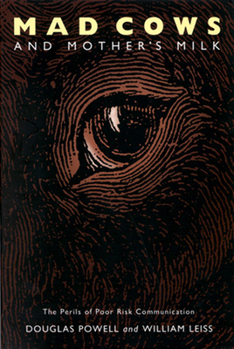Mad Cows and Mother's Milk: The Perils of Poor Risk Communication
Select Format
Select Condition 
Book Overview
The first case study deals with the mad cow fiasco of 1996, one of the most expensive and tragic examples of poor risk management in the last twenty-five years. For ten years the British government failed to acknowledge the possibility of a link between mad cow disease and Creuzfeldt-Jakob disease, the human equivalent, until increased scientific evidence and public pressure forced them to take action, resulting in the slaughter of more than one million cattle. The second study looks at what is commonly known as hamburger disease, caused by a virulent form of the E. coli bacterium, which has struck thousands and killed over thirty people in the last few years. Despite its widespread effects, it is unclear whether scientific knowledge on preventing the disease is reaching the public. Other case studies include the use of a genetically engineered hormone to increase milk production in cows, health risks associated with silicone breast implants, public controversies surrounding dioxins and PCBs, and the introduction of agricultural biotechnology. These case studies show that institutions routinely fail to communicate the scientific basis of various high-profile risks. These failures to inform the public make it difficult for governments, industry, and society to manage risk controversies sensibly and often result in massive costs. With its detailed analyses of specific risk management controversies, Mad Cows and Mother's Milk will help us avoid future mistakes.
Format:Paperback
Language:English
ISBN:0773516190
ISBN13:9780773516199
Release Date:April 1998
Publisher:McGill-Queen's University Press
Length:320 Pages
Weight:1.70 lbs.
Dimensions:0.9" x 6.0" x 9.0"
Customer Reviews
1 rating
A Must-Have for the Professional PR Library
Published by Thriftbooks.com User , 24 years ago
Canadian authors Powell and Leiss provide a structured and interesting look at significant case studies, both Canadian and American, of issues and crisis management communications, or as they call it, "risk communications". The book provides an excellent background into risk communications. From dioxins among Canadian natives to silicone breast implants and cow's milk,excellent and recent case studies are deconstructed to identify the key successes and failures of the risk communications process. Finally, the book ends with 10 "lessons" for risk communicators--providing not so much the "how" answers, as the "why" and "what" answers. Easy to read, but scholarly in nature, an excellent addition to any public relations practitioners' library, and particularly Canadian practitioners, who have little to choose from in the way of good and recent Canadian case study analysis.






